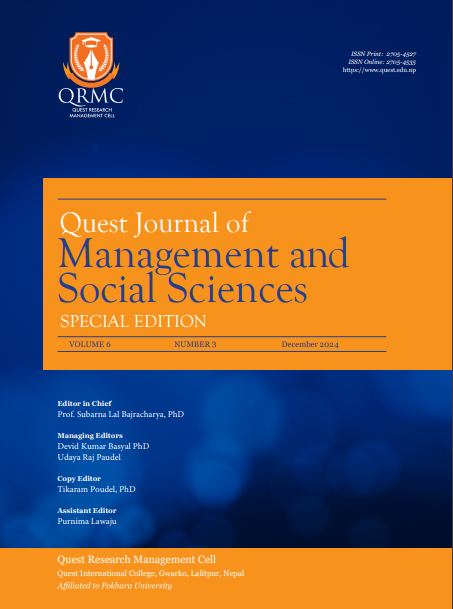Bibliometric Analysis on Participatory Leadership in Local Governance
DOI:
https://doi.org/10.3126/qjmss.v6i3.72684Keywords:
Bibliometric analysis, leadership, governance, participatory approach, sustainability, climate change, thematic evolutionAbstract
Background: This research examines the changing focus in academic studies on governance, leadership, and participatory approaches. There is a growing emphasis on sustainability and climate change. The goal is to track the evolution of these themes and understand their current relevance and interconnections.
Objective: The study aims to analyse trends in governance, leadership, and participatory approaches. It identifies central and declining themes and their roles in addressing contemporary challenges.
Methods: To map research trends, we conducted a bibliometric analysis using co-citation, co-occurrence, and strategic diagrams. Tools like R (biblioshiny) and VosViewer were used over time to visualise connections between key themes. Articles from Scopus spanning from 2003 to 2024 were analysed to determine the prominence and development of these themes.
Results: Leadership has emerged as a dominant theme, especially in governance and health-related research. Governance and participatory approaches, once central, are now receiving less attention. However, sustainability and climate change have become key areas, with governance frameworks addressing global environmental concerns.
Conclusions: The study concludes that leadership is a driving force in current research. Governance and participatory approaches still hold value, particularly when combined with sustainability frameworks. Future research should focus on how these frameworks can evolve to meet modern global challenges.
Keywords: Bibliometric analysis, leadership, governance, participatory approach, sustainability, climate change, thematic evolution
Downloads
Downloads
Published
How to Cite
Issue
Section
License
Copyright (c) 2024 Quest Journal of Management and Social Sciences

This work is licensed under a Creative Commons Attribution-NonCommercial-NoDerivatives 4.0 International License.
This license enables reusers to copy and distribute the material in any medium or format in unadapted form only, for noncommercial purposes only, and only so long as attribution is given to the creator.




